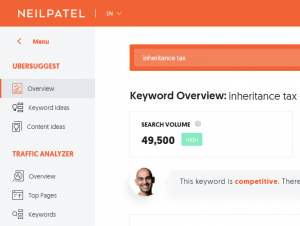Most practices are unclear about how our search marketing for accountants service determines the success, or failure, of a blog.
We gauge ‘success’ in this context by the number of readers, and how many of those convert into leads.
Most writers can choose a topical issue to blog about and release it into the ether when it’s most relevant to readers.
Others then tap into the wealth of insights on Google Analytics, which acts as a key performance indicator and a tool to interpret audience behaviour.
Better wordsmiths go beyond that, subtly optimising content for the web to get the phone ringing off the hook for their clients.
The results of search marketing for accountants
Our blogging service involves working with clients to agree a clear schedule, usually over the course of 12 months.
That sounds simple, but in reality it involves doing our research and knowing precisely what to look for.
While measuring the success of a client’s blogging schedule in the first six months of 2019, Google Analytics exposed an impressive find.
A blog on ‘inheritance tax in 2019/20’ saw this client obtain the fourth highest organic search result for this term on Google, outranking content on the same topic provided by GOV.UK, the Money Advice Service, and the Telegraph.
Its success was down to the content containing just the right amount of less competitive but relevant search terms, and Google acknowledging the practice as an increasingly authoritative source of information.
When we checked in again in October this year, we found that this single page of content was continuing to deliver amazing results.
The blog page in general, for which PracticeWeb provides a flow of tailored content, has generated 54% of the practice’s overall traffic since May.
The inheritance tax post in particular had earned a ‘box of authority’ on page one of Google search results and has earned more than 3,000 unique visits between May and October. The average visitor spend just short of five minutes on the page – evidence that it’s really providing value and meeting their needs.
Content like this has delivered real results in terms of SEO: the firm in question now ranks in position one of organic results on Google for ‘accountants in [town]’ and in eighth position for ‘accountants in [county]’ – both highly competitive search terms.
When we spoke to the firm’s director in May, they were understandably “delighted to see how the blog performed”. In October, they confirmed that enquiries from the website were up and that they’d received queries from several counties over from people who had found the post in inheritance tax via Google.
This proves the concrete value of content. More prospects contacting the practice, either through email or on the phone, about its personal tax planning service. More prospects translates into more clients, some of whom may provide the practice with enormous lifetime value.
Low-competition keywords
Some clients take our SEO for accountants service, others don’t. But we have a duty to optimise our blogs and an innate ability to pull it off.

Inheritance tax receives around 49,500 searches a month in the UK. (neilpatel.com/ubersuggest)
With 49,500 people in the UK googling inheritance tax, it’s difficult to rank highly for such as broad topic.
With far fewer people searching for keyword phrases surrounding inheritance tax in 2019/20 and similar synonyms, it was easier to get a blog on that more specific topic read.
Terms like the ‘nil-rate band’, ‘inheritance tax rate’, and ‘residence nil-rate band’ were all being searched in lower numbers.
By uniting them in one blog, using the relevance of 2019/20, and avoiding keyword stuffing, optimisation took care of itself.
Correct use of headings and links
We follow two very basic rules of thumb when writing blogs for our non-SEO clients. First, to provide internal and external links. Secondly, to format the headings as they are designed to be used.
The internal link usually takes the reader to a relevant service page with the intention of keeping them on the site for longer. The goal, as ever, is to lead them through to the contact page. External links can be for anything, from a piece of research to an upcoming event.
Formatting headings correctly is basic, but important. These are really easy to include in a blog and they draw the reader’s eye to a piece of the article that may be most relevant to them.
We view them as signposts and these signposts are an opportunity to use keywords or synonyms, to reinforce what the page is about. Google will detect and understand this, too.
How PracticeWeb can help
Talk to us about commissioning bespoke content for your website. We optimise it to perform well on the web, whether you ask for our SEO for accountants service or not.
This was originally posted on 7 June 2019 and updated with additional information on 8 November 2019.

